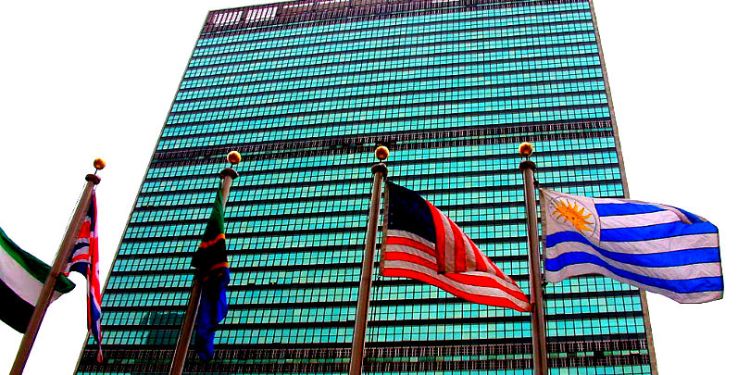The US Commodity Futures Trading Commission is making headlines for its effort to determine whether market manipulation is playing a roll in the volatile cryptocurrency market.
But one of the CFTC’s commissioners is creating a firestorm of his own for an entirely different reason: his remarkable take on the global impact of cryptocurrency.
Here are incredible highlights from Commissioner Rostin Behnam’s recent speech at the United Nations Plaza in New York.
Cryptocurrencies Break Borders and Will Not Be Stopped
“We have learned that virtual assets respect no borders. Regulation is often behind the curve, unable to keep up with daily developments. At least the developments we know about. As a result, some countries have outlawed virtual currencies. Others have new, strict laws to control them. Many countries simply don’t know what to do. Their policy is bewilderment. Or avoidance. And, some countries think virtual currencies are only a problem for developed countries like Switzerland, or Germany, or Singapore, or the United States.
But virtual currencies may – will – become part of the economic practices of any country, anywhere. Let me repeat that: these currencies are not going away and they will proliferate to every economy and every part of the planet. Some places, small economies, may become dependent on virtual assets for survival. And, these currencies will be outside traditional monetary intermediaries, like government, banks, investors, ministries, or international organizations.
We are witnessing a technological revolution. Perhaps we are witnessing a modern miracle.”
Crypto Can Battle Corruption and Create Fairness in Society
“My agency deals with corruption in our markets on a daily basis – as soon as a new product becomes available to the retail public, fraudsters come up with new ways to take advantage of those just seeking to invest their hard-earned dollars.
Now, with the advent of virtual assets, technology may provide a solution. And, the single greatest weapon against corruption may be the cell phone. There are 6.8 billion cell phones in the world, almost one for every person on the planet. Technology could simply bypass corruption. Here is our chance to put money directly into the hands of those who need it, without bribery, rake-offs, graft, and shakedowns. Virtual currencies could transform the economic and social landscape. It could mean a massive, and equitable, shift of wealth. Technology could be transformational, without a military take-over, civil war, or political or religious creed.”
Virtual Currencies Could End Poverty
“I know some have argued that virtual assets could be a way to spread the wealth and end poverty. They have argued blockchain could be the means for ending poverty…that such a possibility should drive the virtual debate.
The so-called “unbanked” could now be on the virtual grid. And, those without computers, some four billion people, could gain an important connection through cell phones. And, the discussion has extended to micro-lending, micro-transactions, greater transparency, and greater financial inclusion. I used a word a moment ago that should echo throughout this hall: transformative. The old limits and parameters may crumble, with the dawn of new technology.”
The Global Elite Will Try to Stop Cryptocurrency
“However, economic elites know all this. They will not be idle. This is what I mean by a powerful danger. If the kleptocracy controls technology and the means of distribution, then they simply accumulate more wealth at the expense of their citizens, draining wealth in cryptocurrencies rather than dollars or euros. Virtual assets may be a stranglehold. In other words, technology can be a weapon against the work of the United Nations and others trying to alleviate poverty or violence. Virtual assets become a means of deeper control of wealth and a means of exploitation.
Of course, social media gives us an example of a virtual battlefield. Censorship accompanies social media in many countries. Or simply consider the size of Google or Facebook, larger than many countries, and wealthier. And more influential, with massive data collection. Then increase all that exponentially. That is the sort of situation that must give us pause. But, events are happening so fast that there isn’t time for reflection or wonder. We are simply trying to understand that which at the time of Dag Hammarskjöld was impossible to imagine.”
In Conclusion
“Blockchain is more than technology: it is an advance that reaches out into every aspect of life. We could use Blockchain to address the most basic, the most primal problems on our planet: corruption, income distribution, poverty, food, and health care. And, the fear billions of people experience everyday as they try to survive.
As a young child, I would come to this building in search of solutions to the problems of the world. Now, today, we may have found one of those solutions – bigger, bolder, more comprehensive, and more effective than anything imagined before. And, as a regulator, I am pleased to be part of your discussion.
We have discussed the most basic problems through the prism of a rising technology. I join with you in our search – our struggle – to find solutions that find the human face of this technology.”
You can check out Behnam’s entire speech from last week’s BFI United Nations Summit here.
Image via Wikimedia Commons
Follow us on X, Facebook and TelegramDon't Miss a Beat – Subscribe to get email alerts delivered directly to your inbox
Check Price Action
Surf The Daily Hodl Mix





